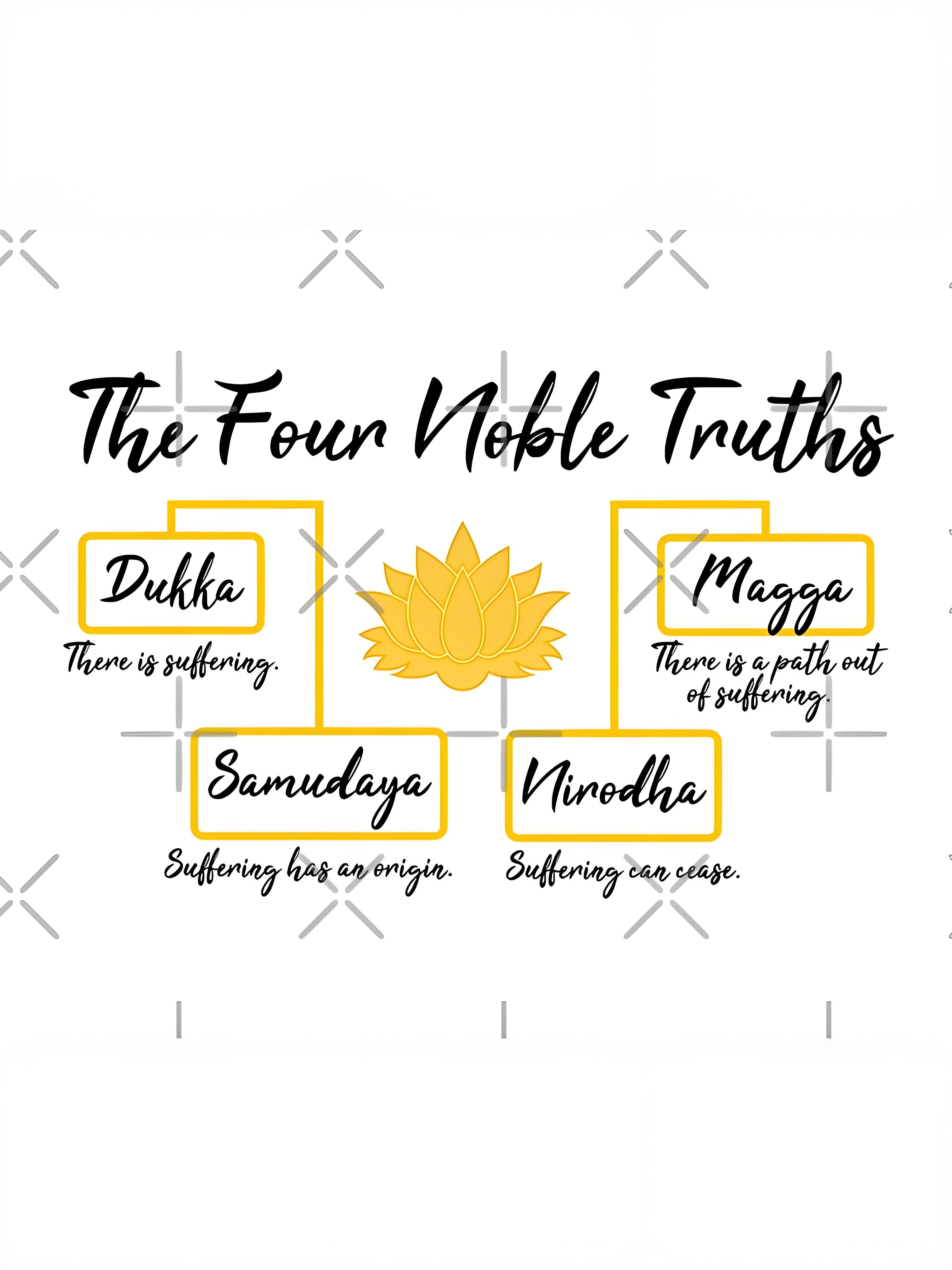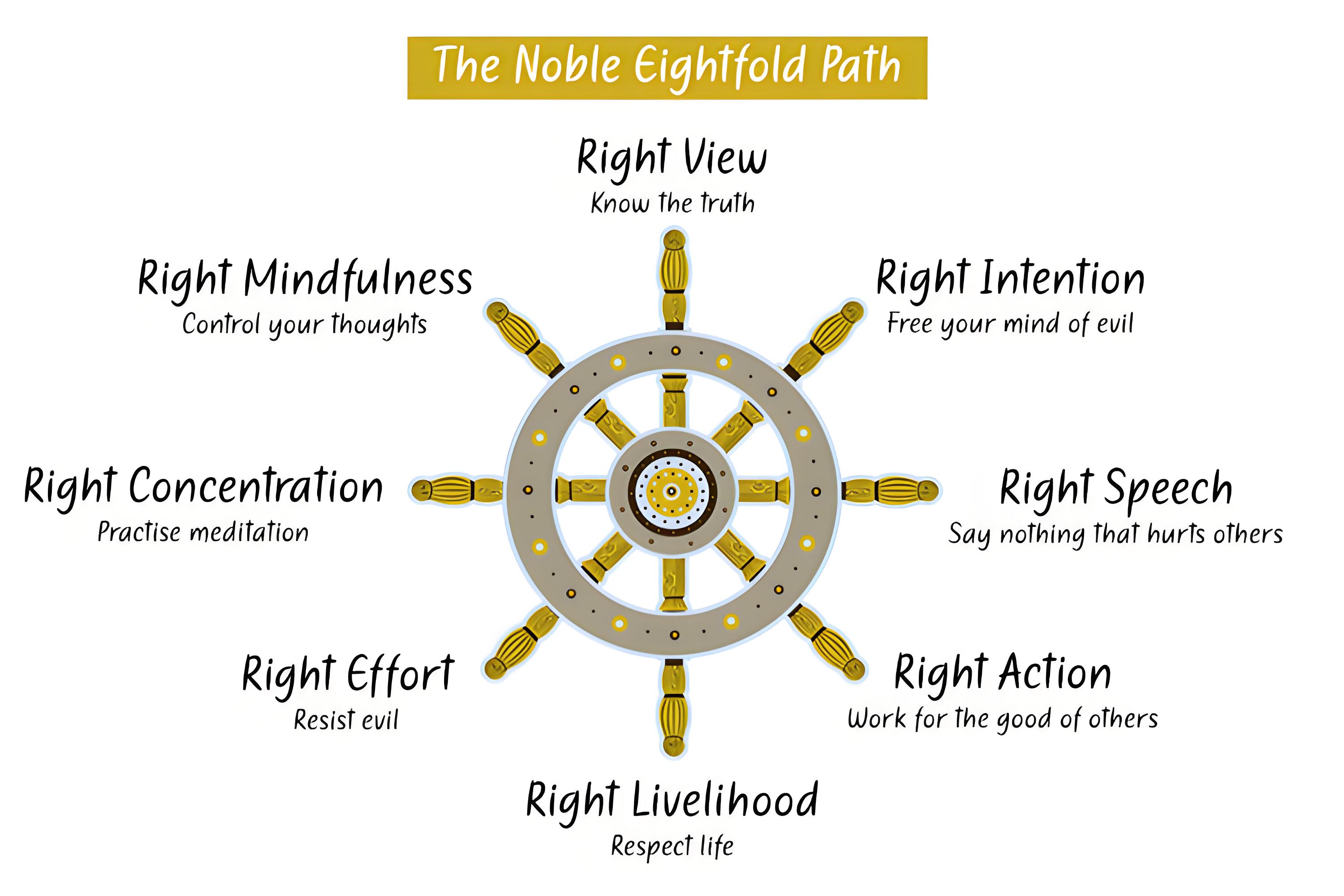Are you seeking a path toward a more meaningful and compassionate life? Buddhist ethics offers a profound and practical framework for cultivating these qualities. This ancient tradition provides a clear path for navigating the complexities of modern life with wisdom, integrity, and kindness. This article will delve into the core principles of Buddhist ethics, explaining how they can guide you toward inner peace and a life of purpose.
What Exactly is Buddhist Ethics?
Buddhist ethics is not a set of rigid commandments but rather a guide for living a life that reduces suffering for oneself and others. Unlike some ethical systems that focus on external rules, Buddhist ethics emphasizes inner development and the cultivation of wisdom and compassion. It’s based on the teachings of the Buddha, which are aimed at achieving liberation from suffering. At its core, Buddhist ethics encourages individuals to make conscious choices that align with these goals.
The Foundation: The Four Noble Truths
At the heart of Buddhist ethics lies the Four Noble Truths, which form the foundation of Buddhist philosophy and practice. These truths, while seemingly simple, offer a profound understanding of the human condition and the path to liberation:
-
The Truth of Suffering (Dukkha): This truth acknowledges that suffering is an inherent part of human existence. It’s not just physical pain but also mental and emotional distress caused by change, impermanence, and dissatisfaction.
-
The Truth of the Cause of Suffering (Samudaya): This truth identifies the root cause of suffering as craving, attachment, and ignorance. These negative mental states keep us trapped in a cycle of pain and dissatisfaction.
-
The Truth of the Cessation of Suffering (Nirodha): This offers the hope that suffering can be overcome. It explains that by removing the causes of suffering, liberation from pain is possible.
-
The Truth of the Path to the Cessation of Suffering (Magga): This is the practical guide for ending suffering, known as the Eightfold Path, a framework of principles for ethical living.
Understanding these four truths provides the basis for the practical application of Buddhist ethics. They highlight the human condition and a pathway for a more meaningful existence.
The Eightfold Path: A Practical Guide to Ethical Living
The Eightfold Path is the cornerstone of Buddhist ethical practice. It’s a guide for cultivating wisdom, ethical conduct, and mental discipline. This path is not a linear process but rather a set of interdependent factors that support each other. The Eightfold Path is often divided into three sections: Wisdom, Ethical Conduct, and Mental Discipline.
Wisdom (Prajna)
The first two aspects of the Eightfold Path fall under wisdom. They provide the necessary understanding for ethical action:
-
Right Understanding (Samma Ditthi): This involves understanding the Four Noble Truths, the law of karma, and the impermanent nature of reality. Moreover, it’s about seeing things as they truly are, free from illusion and delusion.
-
Right Thought (Samma Sankappa): This relates to cultivating thoughts of love, compassion, and kindness. It involves letting go of thoughts driven by greed, hatred, and ill-will.
These two aspects provide the foundation for wise action, steering away from harmful decisions and towards a more compassionate existence.
Ethical Conduct (Sila)
The next three factors of the Eightfold Path focus on ethical conduct. These serve to guide one’s interactions with the world and others:
-
Right Speech (Samma Vaca): This means speaking truthfully, kindly, and usefully. It involves avoiding lying, harsh language, gossip, and divisive speech. Furthermore, it encourages speech that promotes harmony and understanding.
-
Right Action (Samma Kammanta): This encourages actions that are aligned with ethical principles and avoiding harmful behaviors. This involves adhering to the five precepts, which form the core of Buddhist morality.
-
Right Livelihood (Samma Ajiva): This emphasizes earning a living in a way that does not cause harm to others, avoiding occupations that involve violence, exploitation, or deceit.
These aspects are the practical aspects of buddhist ethics in our daily lives.
Mental Discipline (Samadhi)
The final three components of the Eightfold Path are all about mental discipline, they help cultivate the inner peace that supports ethical behavior:
-
Right Effort (Samma Vayama): This means putting forth the effort to cultivate wholesome mental states and reduce negative ones. It requires consistent and sustained effort in our practice.
-
Right Mindfulness (Samma Sati): This is about being fully present in the moment, observing one’s thoughts and emotions without judgment. It involves developing awareness of our internal and external experience.
-
Right Concentration (Samma Samadhi): This is the practice of training the mind to focus on a single object, leading to deeper levels of awareness and insight. It cultivates inner peace and clarity.
These three aspects contribute to a calm and clear mind, which is essential for making ethical choices.
The Five Precepts: Practical Guidelines for Ethical Living
The Five Precepts are fundamental guidelines for ethical conduct in Buddhist ethics. These precepts are not commandments but rather recommendations for living a life free from harm. They are:
-
Abstain from harming living beings: This encourages compassion and respect for all life. Furthermore, it promotes non-violence and avoids causing harm to any living being.
-
Abstain from taking what is not given: This relates to honesty, integrity, and avoiding theft. It promotes generosity and respect for the property of others.
-
Abstain from sexual misconduct: This promotes ethical and respectful sexual behavior, avoiding harm to oneself and others through sexual actions.
-
Abstain from false speech: This encourages honesty, truthfulness, and avoiding lying or deceitful communication.
-
Abstain from intoxicants: This advises against the use of substances that cloud the mind and lead to unethical behavior, promoting mindfulness and clarity.
These precepts offer practical guidance for ethical living, applicable to all aspects of life.
Beyond the Basics: Compassion and Loving-Kindness
While the Eightfold Path and the Five Precepts provide a framework for ethical living, compassion and loving-kindness are at the heart of Buddhist ethics. Compassion (karuna) is the desire to alleviate the suffering of others. Furthermore, loving-kindness (metta) is the wish for all beings to be happy and free from suffering. These qualities are cultivated through meditation and mindful living, helping us connect with others. Moreover, these practices help us to act with kindness and empathy towards all.
Buddhist Ethics in the Modern World
Buddhist ethics isn’t confined to ancient scriptures; it is incredibly relevant to the modern world. As challenges such as environmental degradation, social injustice, and widespread unhappiness grow, the principles of Buddhist ethics offer a practical and necessary response. By emphasizing compassion, mindfulness, and ethical conduct, Buddhist ethics provides a way to navigate modern life with greater integrity and peace.
Applying Buddhist Ethics to Daily Life
You can integrate Buddhist ethics into daily life in various ways:
-
Practice Mindfulness: Pay attention to your thoughts, feelings, and actions. This will help you make more conscious choices.
-
Cultivate Compassion: Make an effort to understand and empathize with the suffering of others. Moreover, practice acts of kindness and generosity.
-
Practice Non-Violence: Be mindful of how your words and actions affect others. Avoid engaging in any form of harm.
-
Speak Truthfully: Be honest and genuine in your communications. Avoid gossip and divisive language.
-
Live Mindfully: Be aware of your impact on the environment. Make choices that promote sustainability and reduce your footprint.
By following these simple steps, one can live a life that reduces suffering for both oneself and others.
Conclusion: A Path to Inner Peace and Meaning
In conclusion, Buddhist ethics offers a comprehensive guide for living a life of meaning, purpose, and compassion. By understanding the Four Noble Truths, practicing the Eightfold Path, and adhering to the Five Precepts, one can cultivate inner peace and act with greater wisdom and kindness. The teachings of Buddhist ethics are not abstract ideals, but rather practical tools for navigating the complexities of the modern world. By embracing these principles, you can embark on a transformative journey towards a more ethical, compassionate, and ultimately meaningful life.
This is a novel insight as it emphasizes the practical aspect of these concepts which can be applied in day to day life.
What do you think about these principles? How do you think these concepts can be implemented into your life? Share your thoughts below and if you want to learn more, check out other articles on this site.



